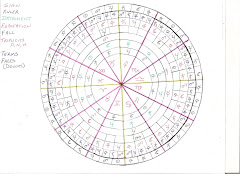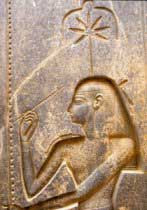William Lilly (1 May (O.S.)/11 May (N.S.), 1602 – 9 June 1681), was a famed English astrologer and occultist during his time. Lilly was particularly adept at interpreting the astrological charts drawn up for horary questions, as this was his speciality.
Lilly caused much controversy in 1666 for allegedly predicting the Great Fire of London some 14 years before it happened. For this reason many people believed that he might have started the fire, but there is no evidence to support these claims. He was tried for the offence in Parliament but was found to be innocent.
Life
William Lilly was born in 1602 in Diseworth, Leicestershire, where his family were long-established yeomen. He received a basic classical education at the school of Ashby-de-la-Zouch, but makes a point of saying that his master never taught logic. At the age of seventeen, his father having fallen into poverty, he went to London and was employed in attendance on an elderly couple. His master, at his death in 1627, left him an annuity of £20; and, Lilly having soon afterwards married the widow, she, dying in 1633, left him property to the value of about £1000.
He began to dabble in astrology, reading all the books on the subject he could fall in with, and occasionally trying his hand at unravelling mysteries by means of his art. The years 1642 and 1643 were devoted to a careful revision of all his previous reading, and in particular, having lighted on Valentine Naibod's Commentary on Alcabitius, he "seriously studied him and found him to be the profoundest author he ever met with." About the same time he tells us that he “did carefully take notice of every grandaction betwixt king and parliament, and did first then incline to believe that as all sublunary affairs depend on superior causes, so there, was: a possibility of discovering them by the configurations of the superior bodies." And, having thereupon "made some essays," he "found encouragement to proceed further, and ultimately framed to himself that method which he ever afterwards followed."
Lilly's most comprehensive book was published in 1647 and was entitled Christian Astrology. It is so large that it came in three separate volumes in modern times, and it remains popular even today and has never gone totally out-of-print. It is considered one of the classic texts for the study of traditional astrology from the Middle Ages, in particular horary astrology, which is mainly concerned with predicting future events or investigating unknown elements of current affairs, based on an astrological chart cast for the time a particular question is asked of the astrologer. Lilly studied thousands of horary charts, most of the time successfully giving correct answers for a wide range of questions from the location of missing fishes to the outcome of battles. Worked examples of horary charts are found in Volume 2 of Christian Astrology.
He then began to issue his prophetical almanacs and other works, which met with serious attention from some of the most prominent members of the Long Parliament. If we may believe his statements, Lilly was on intimate terms with Bulstrode Whitelocke, William Lenthall the speaker, Sir Philip Stapleton, Elias Ashmole and others. Even John Selden seems to have acknowledged him, and probably the chief difference between him and the mass of the community at the time was that, while others believed in the general truth of astrology, he ventured to specify the future events to which he referred.
In 1650, Lilly wrote a preface to Sir Christopher Heydon's An Astrological Discourse with Mathematical Demonstrations, a defence of astrology written about 1608 which was first published posthumously, largely at the expense of Elias Ashmole. Even from his own account, however, it is evident that he did not trust implicitly to the indications given by the aspects of the heavens, but kept his eyes and ears open for any information which might make his predictions safe. It appears that he had correspondents both at home and in foreign parts to keep him conversant with the probable current of affairs. Not a few of his exploits indicate rather the quality of a clever police detective than of a profound astrologer.
After the Restoration he very quickly fell into disrepute. His sympathy with the parliament, which his predictions had generally shown, was not calculated to bring him into royal favour. He came under the lash of Butler, who, making allowance for some satiric exaggeration, has given in the character of Sidrophel a probably not very incorrect picture of the man; and, having by this time amassed a tolerable fortune, he bought a small estate at Hersham in Surrey, to which he retired, and where he diverted the exercise of his peculiar talents to the practice of medicine. He died in 1681. In 2003 a commemorative plaque was placed next to the disused Aldwych tube station on the Strand. Lilly lived close to this spot.
Modern influence
The publication of a facsimile of the original 1647 edition of Lilly's Christian Astrology in 1985 by the Regulus Press, in England, brought about a renaissance in astrological scholarship in North America and Europe, and also a transformation of the techniques of modern astrology. Project Hindsight was an ambitious undertaking in translation begun in 1993 by Americans Robert Hand, Robert Zoller and Robert Schmidt, and supported by reader subscriptions. It translated and published Hellenistic and medieval astrological texts from their original languages. Olivia Barclay and other British astrologers began to unearth Lilly's astrological work, and were influential in the eventual re-publication of Christian Astrology. Astrologer John Frawley, author of several books on traditional astrology, is one of the leading proponents of Lilly's methods, particularly in the branch of Horary Astrology.
Seven of Cups
14 years ago



No comments:
Post a Comment